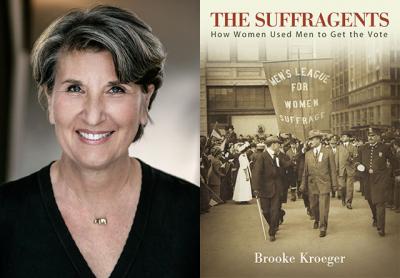A Few Good Men

“The Suffragents”
Brooke Kroeger
Excelsior Editions, $24.95
Although the 19th amendment, which gave women voting rights nationwide, is still less than 100 years old, this month marks the centennial of New York State’s granting women enfranchisement three years before the rest of the nation followed suit in 1920.
Throughout the greater part of this year, New Yorkers have celebrated 100 years of women’s suffrage in various ways (there was even a recreation of a suffrage rally and march on East Hampton’s Main Street in August), but one essential aspect of the women’s suffrage movement — the role men played in helping sway history — has been largely overlooked. That is, until Brooke Kroeger’s “The Suffragents,” which hit bookshelves in September.
Although it is noted that the fight for women’s suffrage began nearly 70 years earlier, “The Suffragents” begins with an image of a parade along New York’s Fifth Avenue in 1911, where thousands of men and women marched under a Men’s League for Woman Suffrage banner. Ms. Kroeger, however, sets the tone for the next 11 chapters, which are separated year by year, from 1907 to 1920, by explaining that those men in attendance were not random supporters of the cause.
She goes on to recount the untold narrative of how some of New York’s most powerful and influential men involved themselves, despite adverse responses, in the women’s suffrage campaign.
While it was the initiative of the National American Woman Suffrage Association to invite upstanding men to support the enfranchisement of women and march, orate, write, and help influence both the general public and government officials, it was not long before the Men’s League for Woman Suffrage, which remained active from 1909 to 1917, attracted thousands of others on its own.
Notable throughout the book, though, are the various men — and, startlingly, women — who publicly shared their beliefs that women were unfit to vote. Not only did female suffragists contend with cunning remarks, men who associated themselves with the movement were demeaned, catcalled, and whistled at during their countless appearances.
Nonetheless, the author, a professor of journalism at New York University, commends the leadership of men like Oswald Garrison Villard, John Dewey, Max Eastman, Rabbi Stephen S. Wise, and George Foster Peabody, all of whom fought for the cause despite a greater public outcry.
Ms. Kroeger, in true journalistic fashion, details the various conversations, correspondence, and setbacks of the campaign, as well as the eventual success the National American Woman Suffrage Association had in gaining the vote. And it could not have been done without the invaluable help of the Men’s League for Woman Suffrage, which largely led the charge in changing public perception on the streets and getting important political figures, such as Theodore Roosevelt and Woodrow Wilson, to eventually accept that women deserved the vote in New York and across the country.
Brooke Kroeger’s previous books include “Nellie Bly: Daredevil, Reporter, Feminist.” She lives part time in East Hampton.
